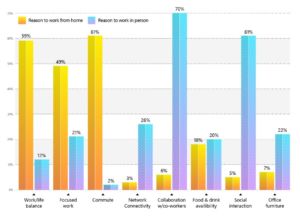What Microsoft’s own research tells us about the realities of remote work

As country after country went into lockdown last year, the world’s largest software company faced its own monumental challenge – how to shift a large portion of its 180,000 employees to remote working.
The pandemic has seen booming demand for Microsoft’s cloud computing services. Its Teams collaboration platform attracted millions of new users, cementing its place as a go-to tool for the digitally-enabled workplace. Many of our own customers have leveraged Teams to great effect over the last 20 months, getting the most out of the Microsoft 365 toolset and using the growing number of third-party apps available within Teams to effectively make it their default work environment.
But as digitally-enabled as Microsoft was before the pandemic, a peer-reviewed study its own researchers undertook, has revealed the impact the shift to remote working had on the company.
It also offers some lessons for the new normal of hybrid working, where employees divide their time between the office and home on an ongoing basis.
Static and siloed
A study published in the scientific journal Nature Human Behaviour last month analysed anonymised emails, calendars, instant messages, video/audio calls and workweek hours of 61,182 US Microsoft employees over the first six months of 2020.
The researchers found that the transition to remote work had a detrimental impact on the level of collaboration at Microsoft.
“Firm-wide remote work caused the collaboration network of workers to become more static and siloed, with fewer bridges between disparate parts,” they noted.
“Furthermore, there was a decrease in synchronous communication and an increase in asynchronous communication. Together, these effects may make it harder for employees to acquire and share new information across the network.”
Collaboration and the open flow of ideas around an organisation are crucial to it functioning effectively and to generating new or improved products and services. Organisations big and small have spent the last 18 months trying to adjust to remote working and, as the nation’s open up for business again, hybrid working.
The message from Microsoft’s research is that companies must continue to evolve their approach to suit the new environment of hybrid work or see productivity take a hit.
“We expect that the effects we observe on workers’ collaboration and communication patterns will impact productivity and, in the long-term, innovation,” the researchers point out.
“Yet, across many sectors, firms are making decisions to adopt permanent remote work policies based only on short-term data.”
The Great Paradox
Microsoft’s CEO, Satya Nadella, has outlined what he calls the Great Paradox – the fact that people want flexibility in their working arrangements, but also to maintain meaningful connections with their employees.
Microsoft has been wrestling with the issue itself, making use of the digital products it sells to improve how it operates with hybrid working as its new reality.
“Here at Microsoft, I can choose to work from another location, not my office for up to 50% of the time. That’s flexible,” Andrew Wilson, Microsoft’s Chief Digital Officer said last month during a WorkLab Live discussion about hybrid work.
“Everybody else is doing that, but on their own timeline because they want flexibility as well. We are thinking a lot about meeting rooms, boring old meeting rooms with tables in the middle of the room and a screen at the end. That’s not really going to fly anymore. How do we create a great experience for everyone on a virtual-first basis?”
Microsoft’s most recent Work Trend Index, an annual global snapshot of the company’s employees’ views on their work and their employer, found that 58% of employees who plan to spend the most and least time in the office, plan to do so for the same reason – to pursue focused work.
Managers planned to spend a higher share of their time in-office than non-managerial employees (45% vs. 39%).
Hybrid work decisions at Microsoft

Keeping employees plugged in
Nathalie D’Hers, Microsoft’s Corporate Vice President of Employee Experience, said on the same webcast that as lockdowns kept workers at home Microsoft needed a better way of giving employees access to company services and keeping them plugged into company-wide developments.
“To address that we created an internal application called My Hub, which connects all of the different aspects of the employee experience to a single mobile application,” she said.
“We were able to work with the Viva Connections team, to inspire a lot of the functionality that is now available in Viva connections to our customers,” she added.
Microsoft’s Viva platform, which is currently in public preview release, has also been thoroughly tested out on Microsoft’s own workforce.
Viva Insights is an amazing module that provides really rich data for both managers and employees,” said D’Hers.
“It gives managers insights into how their teams are feeling in terms of their connection with their manager or with their team and with the company mission. And then on the employee side, it allows people to have insight into how they’re doing in terms of balancing work and life.”
My Hub had been extremely well-received, said D’Hers.
Wilson said that a priority for Microsoft as it eyes up allowing its workers to return to the office for their new hybrid working regime, involves making sure Delta doesn’t spread through its campuses.
“On a trust basis, individuals have been able to confirm that they’re not unwell, confirmed that they have no symptoms,” he said.
“That actually grants them access to the building, not just with a system, but actually the door system that allows them to enter… the campus. Beyond that, I think organisations are now looking very hard at how we prove that everyone is vaccinated. “
New tools for collaboration
Microsoft says the research and experience of using its own products have driven the latest product updates, which were announced last month and include:
- Updates to Microsoft Teams solve for common hybrid pain points and help make hybrid meetings more inclusive and engaging.
- New meeting RSVP and Working Hours features in Outlook make it easier to schedule hybrid meetings and coordinate flexible work hours.
- The Viva Connections app in Teams, now in public preview, creates a central place for employees to connect and complete tasks without breaking the flow of work in Teams.
- New search filters on LinkedIn make it easier to search for remote, hybrid and onsite roles.
- Nearly 40 unlocked LinkedIn Learning courses make skilling for remote and hybrid jobs easier. LinkedIn is also launching its new skill-building platform, LinkedIn Learning Hub, to help employers identify and promote personalized content for their employees. Learn more.
Deptive has extensive experience helping customers optimise hybrid working with our Modern Workplace Practice. Get in touch with us to find out how we can help you make the most of Teams, Microsoft 365 and the Power Platform.

Contact Deptive
Location
Deptive
Level 6 Unit A,
7 Shortland Street,
Auckland Central 1010
Contact Details
0800 000 141
